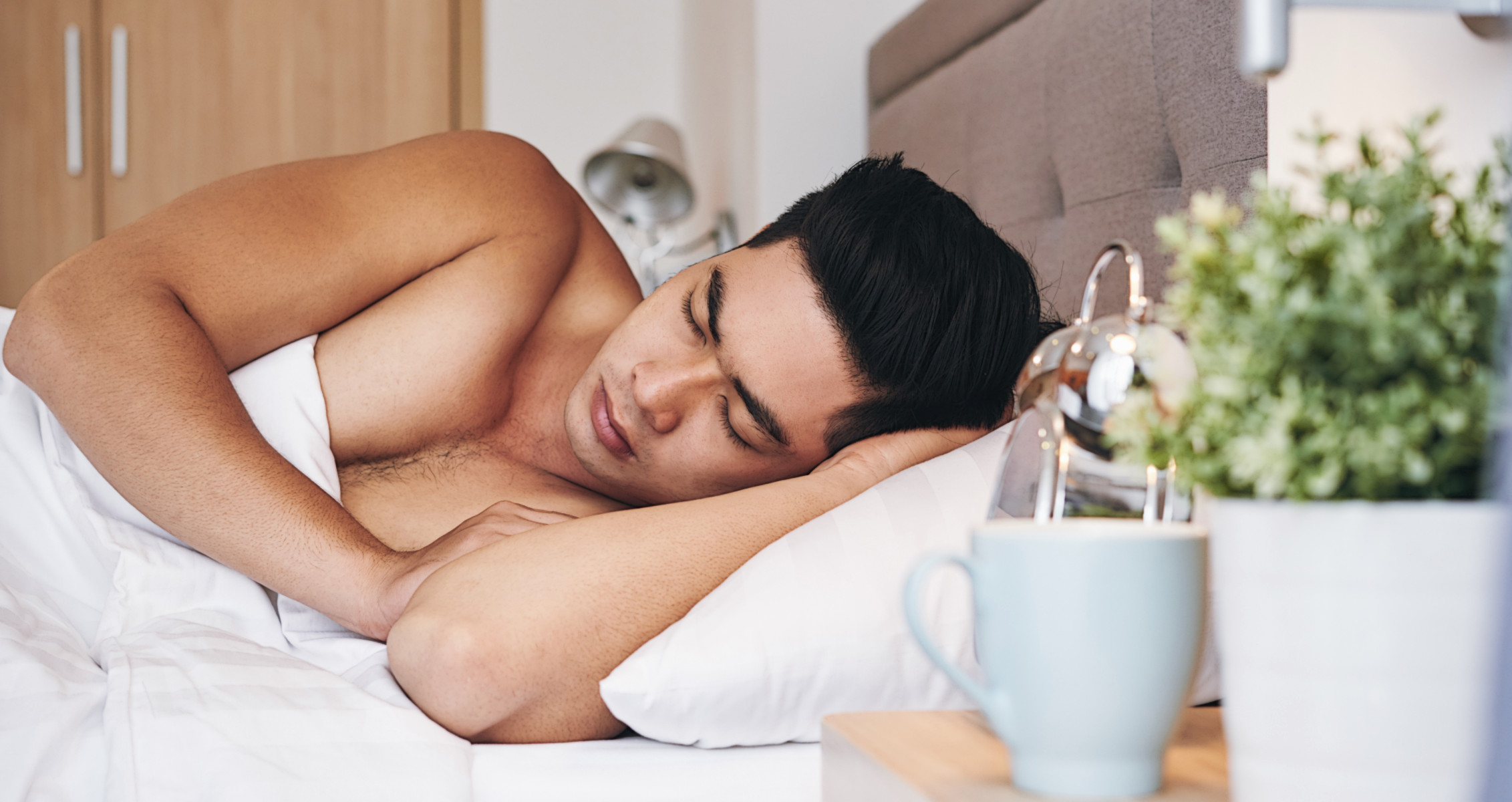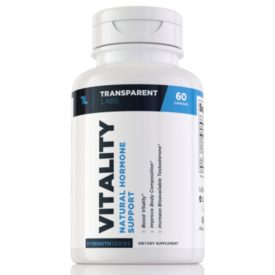Sleep and Muscle Growth: Everything You Should Know
In the internationally bestselling book Sleep Smarter, Shawn Stevenson explains that being awake is catabolic (breaks you down), and being asleep is anabolic (builds up your muscle mass). Sleep is an elevated anabolic state, optimizing the skeletal, immune, and muscle systems’ rejuvenation and growth. Sleep balances your hormones, boosts your metabolism, keeps your immune system healthy, improves your brain functioning, and increases your physical energy. (1)
“Unless you give your body the right amount of sleep, you will never, I repeat, never have the body and life you want to have.” – Sleep Smarter, Shawn Stevenson.
(If you want a quick sleep solution, here is the best rated natural sleep aid!)
In this post, we will explain the importance of sleep and its role on muscle growth. If you are not getting the recommended eight hours a night, you will not build muscle as quickly as you could.
If you are experiencing sleeping problems, then you may be tempted to reach for sleep medications. However, sleeping pills do not replace natural sleep and seriously inhibit our body’s natural sleep mechanisms that are essential for our physical and mental health. However, some natural remedies can help you to get a better night’s sleep. This article will explain how sleep helps you build muscle, we will also suggest some natural remedies for better sleep.
 Sleep and Muscle Growth
Sleep and Muscle Growth
Respected sleep scientist, Matt Walker, begins this TedTalk, by letting us know that men who get an average of four-five hours of sleep have the testosterone levels of someone ten years older. Testosterone is an important hormone when it comes to muscle growth, energy levels, and weight control. It’s no wonder then that sleep deprivation is associated with muscle wasting, poor exercise performance, and increased body fat.
Human growth hormone (HGH) secretion also happens during sleep, so inadequate sleeping hours will result in less of this vital muscle-building hormone. (2)
In one study on over 10,000 people, it was found that those who slept for an average of 6 hours or less had significantly poorer muscular strength than those who slept for 7 or more. (3)
You may feel that you can function well on 6 hours per day; however, the reality is that if you are not getting enough sleep, your body does not have enough opportunity to recover and build new tissue. Important hormones such as testosterone will also be lacking, and this can prohibit gains from being made.
If you are looking for ways to take your strength training to the next level, then adequate sleep might be the answer.
Lack of sleep slows down your metabolism, makes it harder for you to stick to your habits, and increases your cravings for sugary and fatty foods. (4)
Sleep and Performance
Despite the extra strain put on their bodies, athletes frequently miss out on sleep, at least in part, because of their busy schedules that include exercise and food prep.
The occasional late-night movie, or early morning flight, won’t have too much of an effect. However, a sleep deficit that has built up over time certainly will. When you lose out on sleep, your body is in a state of sleep deficit and needs to recover the time. But if you are repeatedly sleeping for fewer hours than your body needs, then this will seriously hinder your body’s natural functioning.
Most of us have experienced poor energy associated with lack of sleep. However, sleep deficit directly affects your body’s ability to store glycogen, which is essential to exercise endurance. (5)
Studies have also shown a direct correlation between muscle strength and hours of sleep. (6)
Another important aspect to consider is your cardiovascular health, for which sleep is imperative. So much so that during daylight savings, when we lose an hour of sleep, there is a 24% increase in heart attacks the following day, and when an hour is gained, there is a 21% reduction.
Matt Walker also stresses the importance of sleep for learning and forming new memories. So when it comes to that mind-to-body connection that is so important for building new muscles, sleep plays an important role.
Sleep and Recovery
Every type of exercise causes muscle damage, especially resistance training. Your body forms new muscles by filling in damaged tissue with extra protein. This is called protein synthesis. A lot of muscle repair and muscle building happens while you sleep, which is why some studies have shown the benefits of eating a high-protein meal before sleep so that amino acid availability is high. (7)
Sleep regulates your hormones, including catabolic and anabolic hormones. Anabolic hormones are beneficial to protein synthesis and are responsible for building muscle. They include testosterone and hormone growth hormones. While catabolic hormones, such as cortisol, breakdown tissue inside the body.
Sleep deprivation causes your body to create more cortisol and less testosterone. (8), Thus hindering your body’s ability to heal body tissue and build muscle.
Pro Tip: Ashwagandha has been shown to decrease cortisol
 How Many Hours of Sleep Do You Need?
How Many Hours of Sleep Do You Need?
If you want to build muscle optimally, you need to get enough sleep. Scientists recommended 8 hours every night for the average person. However, because athletes have additional recovery needs, it is recommended that they aim for 9 hours or 10 hours per night.
A good night’s sleep can improve mood, exercise performance, reaction times, and energy levels (9).
If you struggle to fit in 9 hours at night, then naps can be a great way to fit in extra sleep. Daytime naps have actually been shown to increase levels of anabolic hormones. (10)
Sleep quality is also important. Things like alcohol and stress can hinder the quality of your sleep. High-quality sleep moves through several cycles:
Waking
Before you fall asleep, you are in a state of relaxed wakefulness where your body prepares for sleep by slowing down, reducing eye movement, and relaxing your muscles.
Stage 1
In the first stage of sleep, your eyes close, but you can still be woken easily.
Stage 2: Light Sleep
During light sleep, the heart rate slows, muscles tighten and relax, and the body temperature decreases.
Stage 3 and 4: Deep Sleep
Deep sleep is known as slow-wave or delta sleep. Your brain does not require as much energy, allowing blood and oxygen to supply to your muscles. This stage is categorized by energy and cell restoration, muscle, tissue and repair and growth, and the strengthening of the immune system.
Stage 5: REM Sleep
REM sleep is an active form of sleep. Your brain is almost as active in REM sleep as when you are awake. This stage is categorized by dreaming and body paralysis. REM is an acronym for rapid eye movement, your eyes move around as you dream. REM sleep is important because it stimulates your brain’s areas that are essential to learning and memory formation.
How to Fall Asleep and Stay Asleep
We have established that sleep helps you to build new muscle and have more energy for your workouts. Now we can address what steps you can take to improve your sleep. Here are some great tips:
- The blue light that comes from our phones, laptops, televisions, and tablets blocks melatonin production and inhibits sleep. Therefore, your first step to better sleep could be to stay away from electronics for at least 2 hours before bed. If you use electronics in this time period, consider blue-light blocking glasses to protect your eyes.
- Eat a protein-rich diet. Studies show that high-protein diets reduce the number of times you wake up during the night. (11)
- Cut back on alcohol and stimulants such as caffeine.
- Maintain a regular sleep schedule.
- Sleep in a dark room.
- Eat a light snack before bed. (12)
- Get sunlight onto your skin every day.
- Instead of reaching for your phone, try mindfulness exercises before bed, such as sleep meditations.
- Try herbal remedies for sleep.
Herbal Remedies for Sleep
If you struggle to get enough sleep or find falling asleep stressful, sleeping pills might be an option. You should speak to your doctor and discuss the options available to you. For some people sleeping medication is important, as getting any sleep is better than getting none. However, sleeping pills do not provide the same restorative benefits as natural sleep. (13) Therefore, for muscle growth, muscle recovery, and peak performance medication is not the best option.
Luckily, natural supplements can be very effective and do not inhibit your sleep in the same way. Herbal remedies that are beneficial to sleep are:
Ashwagandha
A traditional Ayurvedic herb that has been used for centuries to aid sleep. (14) The benefits to sleep are thought to be because of ashwagandha’s ability to reduce cortisol levels (15).
In one 2019 study, supplementation with ashwagandha improved both total sleep time and time taken to fall asleep. Those who were given ashwagandha also reported feeling more alert upon waking, with increased focus and less anxiety during the day. (16)
Phosphatidylserine
Phosphatidylserine also reduces levels of cortisol and ACTH (which controls cortisol release). (17) Less cortisol is correlated to a more restful sleep. Although studies are relatively new, supplementation of Phosphatidylserine was shown to promote normal sleep patterns in an animal study. (18).
Magnesium
The biggest deficiency in the world is Magnesium. It is estimated that nearly 82% of the U.S population is deficient in this vital mineral. Magnesium is essential for energy production, protein formation, muscle movements, gene maintenance, and nervous system regulation. It is so important, in fact, that those who have a deficiency are twice as likely to die prematurely. (19)
One of Magnesium deficiency’s key indicators is sleep problems, while healthy magnesium levels are associated with good sleep. If you are considering supplementation for healthy sleep, magnesium is a must.
Panax Ginseng
Panax Ginseng is an ancient traditional Chinese medicine. Studies have shown that Panax Ginseng promotes more good-quality sleep and less wakefulness. Many scientists believe that the other health benefits associated with Ginseng, such as more focus and better mood, are actually due to its ability to improve sleep. (20)
Rhodiola Rose
Rhodiola Rose is an adaptogen. Adaptogens help your body adapt to stress, which is beneficial to sleep.
In one study, participants who took Rhodiola Rosa supplements saw improvements in their sleeping patterns, improved motivation, and less fatigue. They also performed 8% higher than those given a placebo in an exam given at the end of the study. (21).
Transparent Labs Vitality
Transparent Labs Vitality is an innovative 3-in-1 natural test booster and hormone optimizing supplement. A powerful formula matched by amazing ingredients, this is perfect for overall vitality.
Transparent Labs Vitality is an innovative 3-in-1 natural hormone optimizing supplement that can work wonders for your overall health and performance goals. This supplement works to boost testosterone levels while controlling estrogen and cortisol production so those suffering from low testosterone never have to worry. With a powerful formula packed with amazing ingredients, this supplement sets the foundation for lean muscle gains, fat burning, strength, libido, confidence, and overall vitality to ensure your workouts, activities, and lifestyle are all enhanced. With no artificial sweeteners, coloring, or preservatives, you know Vitality is clean with proven and effective ingredients.
Read the full review for Transparent Labs Vitality here.
Wrap Up
Overall, sleep is a crucial part of your bodybuilding success, as it is responsible for things like energy and hormone levels. That being said, there are ways to regulate your hormones and help you achieve a peak physique through supplementation, but it is still best to stay on top of that sleep schedule.
Generation Iron may receive commissions on purchases made through our links. See our disclosure page for more information.
Let us know what you think in the comments below. Also, be sure to follow Generation Iron on Facebook, Twitter, and Instagram.
References
- Stevenson, S. (2016). Sleep smarter. New York, NY: Rodale Books.
- Damien Davenne (2009) Sleep of athletes – problems and possible solutions, Biological Rhythm Research, 40:1, 45-52, DOI: 10.1080/09291010802067023
- Chen Y, Cui Y, Chen S, Wu Z. Relationship between sleep and muscle strength among Chinese university students: a cross-sectional study. J Musculoskelet Neuronal Interact. 2017;17(4):327-333.
- Nedeltcheva, A., Kilkus, J., Imperial, J., Schoeller, D., & Penev, P. (2010). Insufficient Sleep Undermines Dietary Efforts to Reduce Adiposity. Annals Of Internal Medicine, 153(7), 435. doi: 10.7326/0003-4819-153-7-201010050-00006
- Oliver, S.J., Costa, R.J.S., Laing, S.J. et al. One night of sleep deprivation decreases treadmill endurance performance. Eur J Appl Physiol 107, 155–161 (2009). https://doi.org/10.1007/s00421-009-1103-9
- THOMAS REILLY & MARK PIERCY (1994) The effect of partial sleep deprivation on weight-lifting performance, Ergonomics, 37:1, 107-115, DOI: 10.1080/00140139408963628
- Trommelen J, van Loon LJ. Pre-Sleep Protein Ingestion to Improve the Skeletal Muscle Adaptive Response to Exercise Training. Nutrients. 2016;8(12):763. Published 2016 Nov 28. doi:10.3390/nu8120763
- M. Dattilo, H.K.M. Antunes, A. Medeiros, M. Mônico Neto, H.S. Souza, S. Tufik, M.T. de Mello, Sleep and muscle recovery: Endocrinological and molecular basis for a new and promising hypothesis, Medical Hypotheses, Volume 77, Issue 2, 2011, Pages 220-222, ISSN 0306-9877, https://doi.org/10.1016/j.mehy.2011.04.017.
- Cheri D. Mah, MS, Kenneth E. Mah, MD, MS, Eric J. Kezirian, MD, MPH, William C. Dement, MD, PhD, The Effects of Sleep Extension on the Athletic Performance of Collegiate Basketball Players, Sleep, Volume 34, Issue 7, 1 July 2011, Pages 943–950, https://doi.org/10.5665/SLEEP.1132
- J. Waterhouse, G. Atkinson, B. Edwards & T. Reilly (2007) The role of a short post-lunch nap in improving cognitive, motor, and sprint performance in participants with partial sleep deprivation, Journal of Sports Sciences, 25:14, 1557-1566, DOI: 10.1080/02640410701244983
- Lindseth G, Lindseth P, Thompson M. Nutritional Effects on Sleep. Western Journal of Nursing Research. 2013;35(4):497-513. doi:10.1177/0193945911416379
- Ahmad Afaghi, Helen O’Connor, Chin Moi Chow, High-glycemic-index carbohydrate meals shorten sleep onset, The American Journal of Clinical Nutrition, Volume 85, Issue 2, February 2007, Pages 426–430, https://doi.org/10.1093/ajcn/85.2.426
- Walker, M. (2017) Why we sleep. Scribner
- Kaushik MK, Kaul SC, Wadhwa R, Yanagisawa M, Urade Y. Triethylene glycol, an active component of Ashwagandha (Withania somnifera) leaves, is responsible for sleep induction. PLoS One. 2017;12(2):e0172508. Published 2017 Feb 16. doi:10.1371/journal.pone.0172508
- Chandrasekhar K, Kapoor J, Anishetty S. A prospective, randomized double-blind, placebo-controlled study of safety and efficacy of a high-concentration full-spectrum extract of ashwagandha root in reducing stress and anxiety in adults. Indian J Psychol Med. 2012 Jul;34(3):255-62. doi: 10.4103/0253-7176.106022. PMID: 23439798; PMCID: PMC3573577.
- Langade D, Kanchi S, Salve J, Debnath K, Ambegaokar D. Efficacy and Safety of Ashwagandha (Withania somnifera) Root Extract in Insomnia and Anxiety: A Double-blind, Randomized, Placebo-controlled Study. Cureus. 2019;11(9):e5797. Published 2019 Sep 28. doi:10.7759/cureus.5797]
- Starks MA, Starks SL, Kingsley M, Purpura M, Jäger R. The effects of phosphatidylserine on endocrine response to moderate intensity exercise. J Int Soc Sports Nutr. 2008;5:11. Published 2008 Jul 28. doi:10.1186/1550-2783-5-11
- Valadas JS, Esposito G, Vandekerkhove D, Miskiewicz K, Deaulmerie L, Raitano S, Seibler P, Klein C, Verstreken P. ER Lipid Defects in Neuropeptidergic Neurons Impair Sleep Patterns in Parkinson’s Disease. Neuron. 2018 Jun 27;98(6):1155-1169.e6. doi: 10.1016/j.neuron.2018.05.022. Epub 2018 Jun 7. PMID: 29887339.
- Eisenberg MJ. Magnesium deficiency and sudden death. Am Heart J. 1992 Aug;124(2):544-9. doi: 10.1016/0002-8703(92)90633-7. PMID: 1636608.
- Rhee, Y.H., Lee, S.P., Honda, K. et al. Panax ginseng extract modulates sleep in unrestrained rats. Psychopharmacology 101, 486–488 (1990). https://doi.org/10.1007/BF02244226
- Spasov AA, Wikman GK, Mandrikov VB, Mironova IA, Neumoin VV. A double-blind, placebo-controlled pilot study of the stimulating and adaptogenic effect of Rhodiola rosea SHR-5 extract on the fatigue of students caused by stress during an examination period with a repeated low-dose regimen. Phytomedicine. 2000 Apr;7(2):85-9. doi: 10.1016/S0944-7113(00)80078-1. PMID: 10839209.

 Sleep and Muscle Growth
Sleep and Muscle Growth How Many Hours of Sleep Do You Need?
How Many Hours of Sleep Do You Need?








